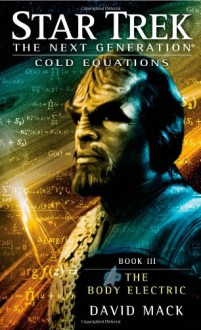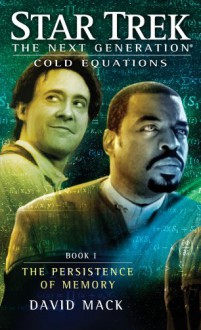
Plot:
Wesley, now a Traveler in his own right, discovers a terrifying machine at the galaxy's core, a machine which creates random wormholes and pulls entire star systems through it to feed a massive black hole. Neither the other Travelers nor Q can offer a solution, so he asks Picard for help in this crisis which could change, and destroy in the longterm, the whole galaxy.
Meanwhile, Data is faced with a terrible choice in his quest to resurrect his daughter.
Review:
I expected a bit more of this final part, to be honest. Again, it was a page-turner, but it wasn't as emotionally engaging as I had hoped.
The main adversary wasn't really terrifying to me in an emotional sense because, even with his record, Mack wouldn't destroy subspace and thus render any further stories moot. To me, the impact of the destroyed worlds got a bit reduced by the multitude of death and destruction in Destiny. So, the only question was who he'd sacrifice to sacrifice the situation. Somehow I feared it would be Data, but fortunately it wasn't. *g* But I wouldn't have put it passed him to shock us readers by such a move. The rest of the machine-plot contained a bit too much technobabble for my taste, and I'm just happy that there wasn't some kind of deus-ex-machina solution, i.e. Wesley hyper-warping the thing to another galaxy or into the blackhole etc. but a solutions that satisfied both sides.
I enjoyed seeing Wesley again, and I loved the scene with Q, but I was a bit perplexed by the crew's nonchalant reaction to him. I mean it's not every day a being like a Traveller pops in unannounced. Of course, I don't know if he made any appearance in another relaunch novel, but I got the impression that no one has seen him since that Riker/Troi-wedding visit-fiasco. So I'd have loved to see a scene with him being introduced to Rene and dealing with Picard being his stepfather. And it kind of bothered me that the rest of the crew called him Wesley or Wes (Smrhova), despite their knowing him for little more than a day (at least, that was my take on the timetable in this book after Wes warps the E-E to the machine). It's a bit the same issue I had with the crew and Data's interaction in Silent Weapons.
On to Data whose part was to me the most interesting one - small wonder, since I only picked up this trilogy because of what the cover for part 1 suggested would happen. Was there really any question as to whom he would sacrifice, given the choice between Rhea and Vaslovik (sorry, he'll always be Vaslovik to me *g*)? Of course, I'd have loved to see them be together, after all Data deserves a loving partner as much as anyone. But this was his chance to bring his daughter back to life - and maybe prevent any future offspring from suffering from the same flaws. And I think any parent would choose like that. I was surprised, though, that Vaslovik found it within himself to still help Data. What a loss it would have been if sacrificing Rhea had also robbed Data of his most heartfelt wish.
As emotional and heart-wrenching as this situation was, I feel kind of cheated that Lal's return's just got dealt with in the epilogue. As I said, to me Data and his mission were the glue that held this trilogy together - so I'd have loved to see this reunion in more detail. And actually I'd have loved if this had happened on the Enterprise with Data and Lal being among friends happy for them.
As for Data torturing Vaslovik... Even if it was apparently mainly for show (though, what kind of "secrets" did Vaslovik reveal?), he still inflicted injuries and submitted to being blackmailed - though, he must have known that doing so doesn't necessarily save Rhea. Or did this play into his hand in questioning Vaslovik after all?
On another note: Didn't Picard and Beverly agree on 3 or 4 more years at maximum on the Enterprise in Silent Weapons? Then why does Picard tell Worf that the wait for Picard to leave the Enterprise (and therefore to Worf's own command) could be a long one? OTOH, I definitely didn't get that "ready to settle down"-vibe from Picard any more which is kind of strange shift when it was so strong still in Silent Weapons.
Finally, I'm looking forward to what's in store next for especially Data and Lal. But it's kind of funny that all 3 most senior officers of the TV-series now have children. I can already see the next generation of Enterprise officers forming. *g*
As for this trilogy, to me the highlight definitely was Soong's sacrificing himself for Data. Unfortunately, the following parts didn't quite live up to the emotional impact of this moment. But Mack at least accomplished something: He got me interested in TNG-novels again, especially by leaving Data's future open.
~~
review originally written in 2012

 Log in with Facebook
Log in with Facebook 







